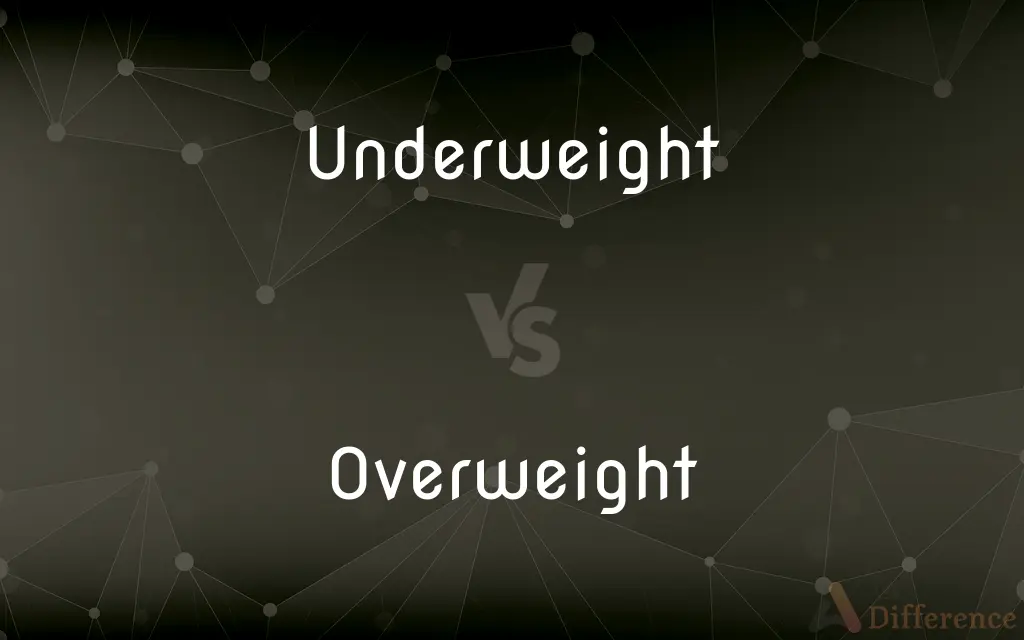Underweight vs. Overweight — What's the Difference?
By Fiza Rafique & Urooj Arif — Updated on March 15, 2024
Underweight refers to a body weight below a healthy range, whereas overweight implies a weight above what is considered healthy.

Difference Between Underweight and Overweight
Table of Contents
ADVERTISEMENT
Key Differences
Underweight and overweight are both terms related to body weight but on opposite ends of the spectrum. Being underweight means having a body weight that is considered lower than what is healthy for a given height, often indicated by a Body Mass Index (BMI) less than 18.5. On the other hand, being overweight signifies a body weight that exceeds what is considered healthy for one's height, typically reflected by a BMI between 25 and 29.9. Overweight individuals might experience this due to excessive calorie consumption, sedentary lifestyle, or genetic predispositions.
The health implications of being underweight include weakened immune function, increased risk of osteoporosis, and potential fertility issues. Undernourished individuals might lack essential nutrients, leading to anemia or vitamin deficiencies. Conversely, overweight individuals face an elevated risk of developing chronic conditions such as type 2 diabetes, heart disease, and certain cancers. Excess body weight can also contribute to joint problems and sleep apnea.
Managing underweight typically involves nutritional interventions to increase calorie and nutrient intake, often through a balanced diet and possibly supplements. Healthcare providers might also address any underlying medical issues contributing to low body weight. In contrast, managing overweight often requires lifestyle modifications focused on diet and exercise to create a calorie deficit. Behavioral therapies and, in some cases, medications or surgery might be recommended for individuals struggling with weight loss.
In terms of societal perception, underweight individuals might face stigmatization or assumptions of eating disorders, despite various possible causes. This can affect mental well-being and self-esteem. Overweight individuals often encounter weight bias and discrimination, which can lead to social isolation, depression, and even reduced healthcare quality.
The prevalence of underweight and overweight varies globally, influenced by factors such as socioeconomic status, cultural norms, and access to food and healthcare. In some regions, underweight remains a significant public health concern due to malnutrition and poverty. Meanwhile, overweight and obesity rates have risen dramatically worldwide, driven by changes in diet and physical activity patterns, highlighting the need for effective public health strategies to address both extremes of body weight.
ADVERTISEMENT
Comparison Chart
Definition
Body weight below a healthy range for height.
Body weight above a healthy range for height.
BMI Range
Less than 18.5
25 to 29.9
Common Causes
Inadequate calorie intake, high physical activity, health conditions.
Excessive calorie consumption, sedentary lifestyle, genetics.
Health Risks
Weakened immune system, osteoporosis, fertility issues.
Type 2 diabetes, heart disease, joint problems.
Management Strategies
Increase calorie and nutrient intake, address medical issues.
Diet and exercise modifications, behavioral therapy.
Compare with Definitions
Underweight
Having a body weight too low for one's height and age.
Despite her active lifestyle, she remained underweight due to her high metabolism.
Overweight
Exceeding the normal weight for one's height and possibly age.
He realized he was overweight when he couldn't fit into his old jeans.
Underweight
Below the standard weight range considered healthy.
His doctor expressed concern about him being underweight and recommended a nutritional plan.
Overweight
Having a body mass index (BMI) between 25 and 29.9.
Her BMI of 27 classified her as overweight.
Underweight
Insufficient body fat to maintain health.
The athlete struggled to increase body fat, remaining underweight.
Overweight
Carrying excess body fat that may impact health.
Being overweight can increase the risk of heart disease.
Underweight
A condition often associated with malnutrition.
Underweight children in impoverished regions suffer from malnutrition.
Overweight
Often resulting from a calorie intake that surpasses energy expenditure.
His sedentary job contributed to him becoming overweight.
Underweight
Reflecting a BMI below 18.5.
Her BMI of 17 indicated she was underweight.
Overweight
A widespread issue in many developed countries.
Overweight and obesity rates are soaring due to sedentary lifestyles.
Underweight
An underweight person is a person whose body weight is considered too low to be healthy. The same concept applies to animals.
Overweight
Being overweight or fat is having more body fat than is optimally healthy. Being overweight is especially common where food supplies are plentiful and lifestyles are sedentary.
Underweight
Weighing less than is normal, healthy, or required.
Overweight
Weighing more than is normal, necessary, or allowed, especially having more body weight than is considered normal or healthy for one's age or build.
Underweight
Insufficiency of weight.
Overweight
More weight than is normal, necessary, or allowed.
Underweight
Of an inappropriately or unusually low weight.
He's so underweight he's had to buy smaller clothes.
He's thirty pounds underweight.
The market trader was fined for selling underweight bags of fruit.
Overweight
Greater weight or importance; preponderance.
Underweight
Not too heavy for an intended purpose.
The suitcase is just slightly underweight; I'll let it on the plane.
Overweight
To weigh down too heavily; overload.
Underweight
(finance) Being less invested in a particular area than market wisdom suggests.
The fund is underweight in mining.
Overweight
To give too much emphasis, importance, or consideration to.
Underweight
(uncountable) The state or quality of being underweight.
Overweight
(of a person) Having a higher weight, especially body fat, than what is generally considered healthy for a given body type and height.
Underweight
(countable) An underweight person.
Overweight
Weighing more than what is allowed for safety or legal commerce.
Underweight
An underweight investment.
Overweight
Having a portfolio relatively heavily invested in.
Underweight
(transitive) To underestimate the weight of.
Overweight
An excess of weight.
Underweight
(transitive) To give insufficient weight to (a consideration); to underestimate the importance of.
Overweight
The condition of being overweight.
Underweight
To invest in less than conventional wisdom would dictate.
Overweight
(countable) An overweight person.
Underweight
Having unattractive thinness;
A child with skinny freckled legs
A long scrawny neck
Overweight
A security or class of securities in which one has a heavy concentration.
Apple common stock is one of our overweights.
Overweight
(transitive) To weigh down: to put too heavy a burden on.
Overweight
(transitive) To place excessive weight or emphasis on; to overestimate the importance of.
Overweight
Weight over and above what is required by law or custom.
Overweight
Superabundance of weight; preponderance.
Overweight
Overweighing; excessive.
Overweight
Having a weight in excess of what is normal, proper, or expected; as, the doctor recommends dieting to all his overweight patients; overweight luggage will incur an extra charge.
Overweight
The property of excessive fatness
Overweight
Usually describes a large person who is fat but has a large frame to carry it
Common Curiosities
How can one manage being underweight?
Increasing calorie and nutrient intake and addressing any underlying health issues.
What health risks are associated with being underweight?
Risks include weakened immunity, osteoporosis, and fertility issues.
How is overweight defined in terms of BMI?
A BMI between 25 and 29.9 indicates overweight.
What are common causes of being overweight?
Causes include excessive calorie intake, a sedentary lifestyle, and genetic factors.
What societal challenges might underweight individuals face?
They may encounter stigmatization and assumptions of eating disorders.
What health risks are linked to being overweight?
Risks involve type 2 diabetes, heart disease, and joint issues.
Do overweight individuals face societal challenges?
Yes, they often face weight bias and discrimination.
Can underweight affect mental health?
Yes, it can impact mental well-being and self-esteem.
Is being underweight always due to an eating disorder?
No, it can result from various factors, not just eating disorders.
How does the prevalence of underweight and overweight vary globally?
It varies based on socioeconomic status, cultural norms, and access to resources.
What is the BMI range for being underweight?
A BMI less than 18.5 is considered underweight.
How can overweight be managed?
Through diet and exercise changes, and possibly behavioral therapy.
Can overweight lead to mental health issues?
Yes, it can contribute to depression and social isolation.
Can lifestyle modifications alone manage overweight?
Often, but some cases may require medical intervention.
Are underweight and overweight solely individual issues?
No, they reflect broader societal and environmental factors.
Share Your Discovery

Previous Comparison
Custard vs. Pie
Next Comparison
Dinner vs. LunchAuthor Spotlight
Written by
Fiza RafiqueFiza Rafique is a skilled content writer at AskDifference.com, where she meticulously refines and enhances written pieces. Drawing from her vast editorial expertise, Fiza ensures clarity, accuracy, and precision in every article. Passionate about language, she continually seeks to elevate the quality of content for readers worldwide.
Co-written by
Urooj ArifUrooj is a skilled content writer at Ask Difference, known for her exceptional ability to simplify complex topics into engaging and informative content. With a passion for research and a flair for clear, concise writing, she consistently delivers articles that resonate with our diverse audience.
















































